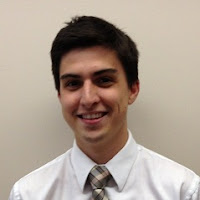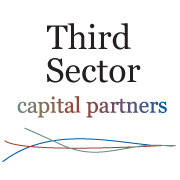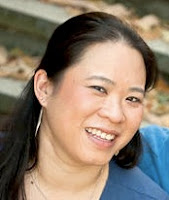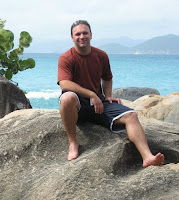Graduate Student Blog
Studying an International MBA in China
Post by: Gilberto Millares
International MBA, ‘13
Imagine moving thousands of miles away from home to a place with a language you don’t understand, a life style opposite to what you are used to, and knowing absolutely no one. Sounds exciting, right? That is exactly how 27 students coming from 14 different countries started the International MBA program this past summer. Specifically for me, after a trip of about 27 hours from Mexico City to San Francisco and then Beijing, I finally arrived in an exotic place where I would share my life with a group of strangers who quickly became my friends and family. After a couple of days of wandering around Beijing and overcoming the worst of the jet lag, we finally started a summer of intense work and play.
 So, how did we do this? Well, we started by living for a month in Beijing and then two in Shanghai. We had guest lecturers, visited local and international companies, and explored important cultural places such as the Forbidden City and the Great Wall. In our spare time, we would eat out both at street meat grills and in fancy mandarin duck restaurants; we would go bargaining to markets and dancing in basements with locals. We strived to understand the motivations of the Chinese and their vision for the future, to see how they have achieved such prolonged growth. We studied China and the world with a completely new perspective that will better allow us to make decisions with a global perspective. Most importantly, we learned how to bring back all this knowledge and apply it to our future careers and businesses.
So, how did we do this? Well, we started by living for a month in Beijing and then two in Shanghai. We had guest lecturers, visited local and international companies, and explored important cultural places such as the Forbidden City and the Great Wall. In our spare time, we would eat out both at street meat grills and in fancy mandarin duck restaurants; we would go bargaining to markets and dancing in basements with locals. We strived to understand the motivations of the Chinese and their vision for the future, to see how they have achieved such prolonged growth. We studied China and the world with a completely new perspective that will better allow us to make decisions with a global perspective. Most importantly, we learned how to bring back all this knowledge and apply it to our future careers and businesses.
Gilberto Millares is an International MBA student with experience in strategy and operations consulting and an expert in cooking noodles and dumplings, skills aquired during his summer in China.
The End of an Era, the Start of a Dynasty
Post by:Justin Tyo
MS in Mathematical Finance Candidate, ‘14
We have begun developing a family-like atmosphere within our Mathematical Finance program and it has only been three weeks. The orientation week and several social events have made it all possible through the help of the Graduate Programs Office. They do a wonderful job in coordinating events that bring us close together from the start. Most importantly however, meeting some of the brightest minds from not just across our nation but across the planet is an invaluable experience which has certainly made me proud to be a part of this program. I am looking forward to the next 17 months and growing the professional relationships that I have begun to develop with my classmates.
My Summer Internship at the World Health Organization
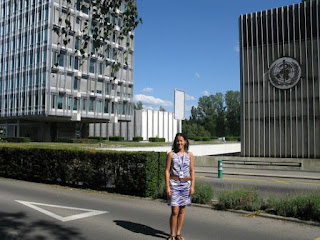 |
| Outside the WHO main building |
 Catherine Shih is a 2ndyear MPH-MBA with experience in tax policy, international trade, and organizational development. She spent the summer in Geneva working for the World Health Organization and eating chocolate.
Catherine Shih is a 2ndyear MPH-MBA with experience in tax policy, international trade, and organizational development. She spent the summer in Geneva working for the World Health Organization and eating chocolate. ![]()
My Summer Internship at Aimia
 |
| Montreal |
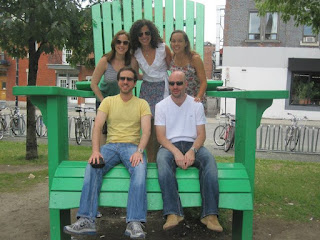 |
| Alex (bottom left) and friends in Montreal |
 Alexander Bonder is a 2nd Year MBA. Although life, work and graduate school have taught him about the "turbulent" nature of the airlines industry, turbosine seems to be in his veins.
Alexander Bonder is a 2nd Year MBA. Although life, work and graduate school have taught him about the "turbulent" nature of the airlines industry, turbosine seems to be in his veins.![]()
Summer of Social Innovation Finance
Education Pioneers [Part 2 of 2]
Part 2 by:
Pammi Bhullar, MBA 2013
Renato Orozco, MBA 2013
Dana Connolly, MS-MBA 2013
PAMMI BHULLAR – MBA Class of 2013, PNP -- BOSTON COHORT [Boston Public Schools]
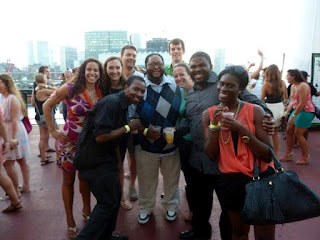 |
| Pammi (left), with some Boston fellows |
This summer I worked in the Finance and Budget Office at Boston Public Schools (BPS). BPS is dedicated to improving student achievement by providing the leadership, procedures, systems, and customer support necessary for principals to maximize teacher effectiveness. As a Fellow, I collaborated with central office and school leaders to build a culture of documenting and effectively communicating policies and procedures. My ability to empower employees to execute a cultural change on their own and to effectively communicate solutions in a simple manner enabled BPS to decrease the time spent on transactional issues and more time on empowering leaders to make financial decisions. In the long-term this will support principals in the instructional and managerial aspects of creating more effective, better prepared teachers.
A combination of my EP experience and honest feedback I've received along the way has directed me to a career in empowering others to achieve their potential. This could be through leading professional development or fellowship programs, or through empowerment initiatives for communities through capacity building.
Through EP workshops, visiting schools, and working at Boston Public Schools I gained tremendous insight into several aspects of the educational system, including teacher evaluations, weighted student funding, after-school student learning opportunities, and labor relations. This well-rounded exposure to a sector deeply in need of reform has challenged my initial perspective on what it takes to prepare students for the working world.
During the summer, I became friends with an ambitious young lady and EP Fellow who recently started a nonprofit called FuelEd. Through our connection at EP, we became friends and I was able to contribute to her organization and witness its exceptional growth during its first year of operations. Seeing her dedication to developing teachers' capacity for building more effective relationships with students has been inspirational.
RENATO OROZCO: MBA Class of 2013, PNP -- NEW YORK CITY COHORT [Teach for America]
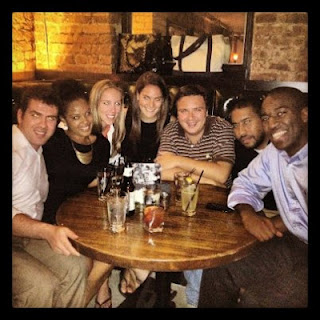 |
| Renato (left), and a few other NYC Fellows |
Teach for America supports, prepares and develops 10,000 teachers to face the challenge of closing the achievement gap in the United States. As a Fellow with the Strategy & Innovation team, I evaluated pilot projects and created a snapshot of how resources are being allocated to support teachers. This analysis was subsequently used to inform TFA's senior leadership on what projects should be scaled-up.
My previous professional background is on business and government. Since I had never worked in a nonprofit, this experience helped me to confirm this industry as my post-MBA career objective.
Through EP workshops, interacting with other EP Fellows and working at TFA I gained tremendous insight into several aspects of the educational system and challenges related to improving education.
I had the chance to organize an EPU (Ed. Pioneers Unplugged Workshop) where I and other fellows pitched our start-up ideas to the audience, receiving feedback. It was great to have so many people help to think through my project and contribute with their advice.
DANA CONNOLLY – MS-MBA Class of 2013, PNP – BAY AREA COHORT [KIPP Foundation]
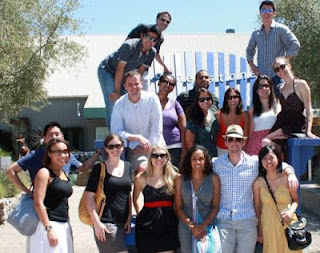 |
| Dana (3rd from left), and other Bay Area fellows during a trip to Sonoma |
KIPP (Knowledge is Power Program) is the name associated with a network of charter schools that began with just two teachers in a single classroom and has grown to more than 2,700 teachers serving more than 39,000 kids in 125 schools across the country. The KIPP Foundation was created in order to grow this network by training outstanding school leaders to open and operate autonomous KIPP schools and supporting excellence and sustainability across the network and leading network-wide innovation efforts.
My specific role was to support the Talent Team, which is responsible for the acquisition, development, and retention of superstars who will maintain the extraordinary momentum of the Foundation and in turn support the growing nature of the KIPP network. I created the first ever “State of the Talent” report to analyze trends regarding turnover rates, professional development opportunities, alignment with core values, and other aspects that define the nature of the Talent at KIPP Foundation; essentially a story-telling tool to influence strategic human capital decisions for the near future.
My intended career path is still hazy, but as a result of this summer I have at the very least become more aware of the breadth of career possibilities that exist within the education sector. This experience confirmed for me that I want to work for organizations or companies that have children (and/or other populations who require a great deal community support to thrive) at their primary core. I’ve been reassured that my degrees and experiences can absolutely be used to help others realize opportunities, achievements, and happiness that they might otherwise be denied.
Another lasting benefit of this summer is the network that I’ve become a part of – and not just with my cohort and Bay Area alumni. I feel a deep connection to all past, present and future Education Pioneers and am incredibly humbled (and still bewildered as to how I even got this opportunity) that I will forever be associated with these people who are amazingly brilliant, driven, and compassionate.
I personally had never spent more than 2 weeks away from my beloved East Coast, but once the Dunkin Donuts withdrawal wore off and I realized that it’s ok to wear a coat in July, I absolutely loved the Bay Area! I got to bond with my Cohort over tacos, street festivals, hiking trips, stoplight parties, after-work discussions, brown-bag lunch sessions, and a party bus to wine country.
------
To me it seems that the best words to describe the feeling that all six of us are walking away with after this summer are “inspired” and “invigorated” (We’re also relieved that no one was bitten by snakes or had their oxen get ill along the way). The summer gave us exposure into some of the fantastic work that is being done in the education sector and also ignited an undeniable spark to be ready and optimistic about the work that still needs to be tackled so that all kids can have the same access to a phenomenal education and in turn the same chances to achieve in the classroom and far beyond.
![]()
Education Pioneers [Part 1 of 2]
Intro and blog post coordinating by Dana Connolly, MS-MBA, 2013
 |
| Matt (right), enjoying a Rangers game in his home state |
A leading catalyst for progress, Educate Texas, a public-private initiative of Communities Foundation of Texas, is an innovative alliance of public and private groups that share a common goal: improving the public education system so that every Texas student is prepared for success in school, in the workforce, and in life.
My work focuses on organizational goals, strategies and metrics for Educate Texas which help track the performance of the main programs and initiatives that are currently being run. My main role involves a project aimed at identifying specific metrics that can be used to track progress and effectiveness of the strategies and creating a tool that will allow Educate Texas employees and partners to easily capture the defined metrics.
I chose to become an Education Pioneers Fellow to gain further understanding of the major issues in education and bring my leadership, organization and quantitative skills to the sector to help expand and increase the effectiveness of potential solutions. This summer has helped me determine where I want to focus my work in education - on out of school time nonprofits and social ventures.
I think the cohort experience is the strongest benefit to the program. Meeting with a group of individuals that all want to improve education but in different ways helps expand your views and find new areas where you can grow. I met some great people in my cohort and look forward to continuing to build our relationship and seeing where we all end up in 5-10 years.
One of the fellows in my cohort was placed with the George W. Bush Institute this summer and due to this placement, all of the fellows in the Dallas area were able to meet with former President Bush for about an hour to talk education and the goals of his foundation. It was an extremely interesting experience. Regardless of politics (mine or yours), it was incredible to meet a former President and something that only happened because of my involvement with Education Pioneers.
 |
| Sonal (above) and her project being presented to a group of around 200 (below) |
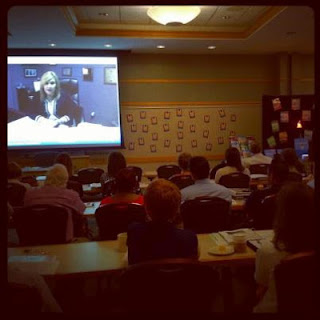 |
I chose to become an Education Pioneer Fellow because I wanted to see what the variety of opportunities were in the Ed space besides being an educator or administrator. Prior to the fellowship, I was a Massachusetts Promise Fellow (AmeriCorps) at Science Club for Girls in Cambridge, MA and before that I worked in IT service delivery at State Street Corporation.
My project is to create the digital and social media presence for Curriculum Associates relatively new education technology product, i-Ready. In my role I've created the questions, slated customers for interview, filmed the interviews as well as edited the footage. Soon this footage will be used to build up the organization's YouTube channel and expand CA's social media footprint. So far I've traveled to North Carolina, Louisiana, Ohio and California and am slated to make some final stops in New York and Connecticut.
Coming from a non-educational background (State Street and then AmeriCorps), I always thought that you could only be a teacher or a principal in the education space. But since my time as an Ed Pioneer Fellow, I've learned that there are a ton more things that are going on in this sector and I'm excited to see first-hand that digital and social media marketing are a part of this space.
 |
| Rachel (second from right) with her hybrid group in Boston |
I was part of the Greater Boston cohort, with a placement at Boston After School and Beyond, a public/private partnership dedicated to supporting, strengthening, and expanding the city's after-school sector. I worked on a development strategy for the organization, identifying major funders in the field and the best paths for connecting with them in order to build a long-term, sustainable revenue stream.
While I was already certain that I would return to the field of education after business school, the fellowship helped me refine my understanding of the type of organization I'd like to work at: one that is nimble, collaborative, and moving the field forward in a significant way. It also showed me that I'd like a job where I'm working with kids at least some of the time -- some hybrid of the organization-strengthening work that is so important, and the youth-interaction work that is the heart and soul of a career in education.
The best moments spent with my cohort were those in which I got to learn about other Fellows' backgrounds and experiences. Talking with former teachers informed my understanding of systems-change at the school level, while conversations with those coming from private-sector roles showed me why an outside perspective is sometimes so important. I know that it is this network of professionals, all of whom care deeply about education equity, that will be the most valuable element of my experience in years to come.
STAY TUNED FOR ENTRIES FROM 3 MORE EDUCATION PIONEERS INTERNS NEXT WEEK!
![]()
Asian Field Seminar, Spring 2012
Sheri Cheng
PEMBA, 2012
From May 27th to June 8th, a group of 21 MBA students along with Professor Jay Kim of the Operations and Technology Management department and Dave Veira of the Graduate Program Office traveled through Asia for the Asia Field Seminar. The trip included PEMBA students from both the Charles River campus and the North Campus, and a few full-time students who were completing this trip as the last course of their MBA program.
 |
| Caroline Keely enjoys the tabletop touchscreen computer in the Lenovo showroom |
 |
| The group, in Tiananmen Square in Beijing |
 |
| (L to R) Evan DiLeo, Jonathan Caldwell, Ken Hoge, Caroline Keely, and Gaurav Tanna take smoothie break with Professor Kim in the Forbidden City in Beijing |
 |
| Maggie Liu and Caroline Keely with Professor Kim at the Great Wall in Badaling China |
 |
| Mark Duthe rides a Segway at Olympic Stadium in Beijing, China |
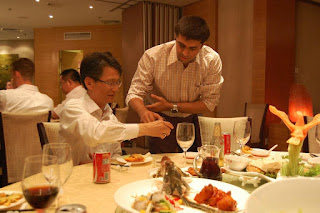 |
| Gaurav Tanna pours baijiu for Mr. Harry Sung, president of the AC division of LG China as a ritual of respect |
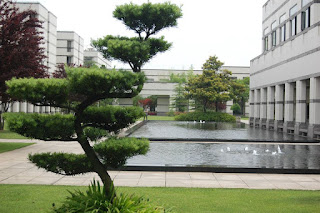 |
| China Europe International Business School (CEIBS) campus, Shanghai, China |
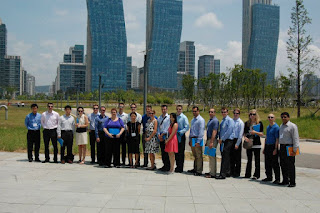 |
| The group at the Incheon Free Economic Zone (IFEZ), a planned urban area outside of Seoul |
 |
| The group at GM Korea |
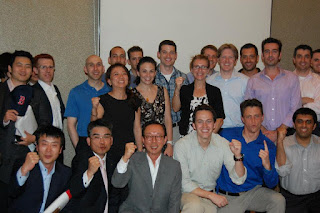 |
| With the Korean BU MBA Alumni Association, whose motto is always, "One BU!" |
![]()
European Field Seminar, Spring 2012
 |
| Team members from the trip getting to know each other at the welcome dinner |
 |
| Monica at the Audi plant in Hungary |
 |
| Inside the European Commission |
 |
| Team members posing in Budapest |
 |
| Team members in Paris during the weekend |
 |
|
In front of a windmill outside of Amsterdam the weekend before the trip
|
As a member of the Leadership and Organizational Transformation concentration, I personally gained the most in learning about leadership in different European cultures. In many of the companies we visited, I observed how leaders adapt their styles to get the most out of a European employee base. Through this observation, I learned that leaders were using the same leadership frameworks that we employ, however they were adapting them to the culture of the organization that they were leading. The importance of situational leadership has now grown on me, and I have been able to carry apply many of my observations in subsequent leadership coursework.
Tom is a Manager in Process Improvement at Liberty Mutual Insurance. He is expected to graduate from the Part Time Evening MBA Program at BU in 2013 with a concentration in Leadership and Organizational Transformation.
My Summer Internship with the Cohort Cup
| Olivia Horsfield (GSM, '13), Parag Vaish (GSM, '03), Amy Fox (EDM, '12), Parker Fox (GSM, '12), and Ryan Sosin (GSM, '13) represent BU at a Red Sox-Mariners game at Safeco Field |
As a Cohort Cup champion, let me offer a few takeaways from my first year. While it is natural to feel uneasy when you don’t have an internship by Red Sox Opening Day, try to stay calm and focused – a lot of my classmates landed great internships in the waning days of the semester. Second, look for internships in cities you may want to live in after you graduate – it is like taking a city for a test drive. Finally, go to Cohort Cup events and try to beat our first-year MVP Nishant Sharma’s attendance record.
 Ryan Sosin is a rising 2nd Year MBA with experience in collegiate athletics and a life-long dream of being an astronaut. You can find him defending the Cohort Cup at Cornwall’s. Follow @thefosh on Twitter.
Ryan Sosin is a rising 2nd Year MBA with experience in collegiate athletics and a life-long dream of being an astronaut. You can find him defending the Cohort Cup at Cornwall’s. Follow @thefosh on Twitter.
![]()




